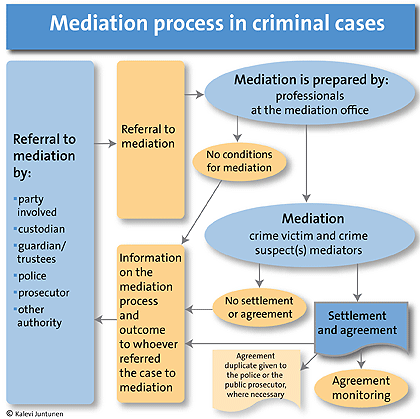Mediation process in criminal cases

In criminal cases mediation can be reguested by
- parties involved the crime
- guardian or trustees
- legal representative of a child or a young person
- police or prosecuting authority or other authority
Only police or prosecuting authority has the right to refer a case for mediation if the crime involves violence directed at the suspect’s spouse, child, parent or other comparable near relation.
The officials in mediation prepare the case: e.g. they asses whether the case is eligible for mediation and ensure that the conditions for mediation are fulfilled. If there are no conditions the case will be returned to the referring authority.
If mediation is initiated, the mediation officials nominate the mediatiors for the case. Mediators contact the parties and arrange the meetings with the parties. The parties are active in the discussions.
Mediation may progress to a settlement or an agreement or it may be interrupted by parties or mediation officials.
If the parties reach an agreement, the mediators help them to draw up the agreement. The parties sign and the mediators verify the agreement with their signature. An agreement monitoring may by arranged.
After mediation the mediation officials submit a report on the mediation process to the referring authority. The police and prosecuting authority make the decision on further proceedings.
The district court may confirm all or a part of a settlement reached in out of courts mediation enforceable. Proceedings shall be commenced by a written application submitted to the district court office. The application may be submitted by the parties, by one or more parties. The mediation officials give advice in more details.



